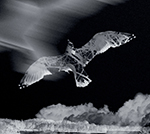 This is a phenomenal album and a wonderful example of the typical Polish Sung Poetry idiom, which presents the poetry by Polish poet Krzysztof Kamil Baczynski transformed into songs by singer / songwriter Slawomir Zygmunt. The album includes seventeen songs based on the poems by Baczynski, all original compositions by Zygmunt, who sings and plays guitars and harmonica. He is assisted by Krzysztof Domanski, who plays acoustic guitar and Aleksander Nowacki, who plays keyboards and also served as the sound engineer of the recording sessions, which were recorded in his studio. It is pretty remarkable that the album's rich instrumental sound was created by just three musicians.
This is a phenomenal album and a wonderful example of the typical Polish Sung Poetry idiom, which presents the poetry by Polish poet Krzysztof Kamil Baczynski transformed into songs by singer / songwriter Slawomir Zygmunt. The album includes seventeen songs based on the poems by Baczynski, all original compositions by Zygmunt, who sings and plays guitars and harmonica. He is assisted by Krzysztof Domanski, who plays acoustic guitar and Aleksander Nowacki, who plays keyboards and also served as the sound engineer of the recording sessions, which were recorded in his studio. It is pretty remarkable that the album's rich instrumental sound was created by just three musicians.
Baczynski, who was killed during the Warsaw Uprising in 1944 being just 23 years old at the time, left a remarkable body of revolutionary poetry and prose, some of it very universal and patriotic but also extremely personal and revealing. His Jewish origins and his brief heroic life as member of the Polish Resistance are just one of many tragic stories of the Polish People during WWII. His poetry was sadly kept mostly in hiding during the post WWII years for political reasons, which are too complicated to be explained here, but this album marks a vindication of his remarkable contribution to Polish Culture.
The music fits the poems perfectly and the heartfelt and intelligent delivery by Zygmunt emphasizes their lyrical depth. The overall sound and feel of the album is very close to similar albums recorded during the golden decade (1965-1975), but is by no means outdated, only deeply nostalgic. Somewhere between Folk-Rock and cabaret, between acoustic and electric, always full of good taste and elegance this collection of songs is an absolute delight from start to finish.
It is impossible to ignore the obvious similarities between this album and the work of the great Polish bard Marek Grechuta. This album has many parallels to Grechuta's work: the same musical affinities, the sane style of delivery between singing and recitation, the same folksy instrumentation and above all the emphasis on the lyrics and their deepest meaning. Of course I don't suggest imitation, or anything remotely similar, I simply immensely enjoy these parallels, which probably mean that Sung Poetry has an ideal musical setting, which is somewhere within these parameters.
The enormous appeal of this album is obviously mostly limited to the audience who speaks the Polish language. But the quality of the music and the delivery often transcends the language barriers, like for example the work of Grechuta, who is quite popular even in such remote Cultures as Japan. I can only hope that this album will achieve a similar fate. For Polish poetry and Sung Poetry lovers, this is an absolute must!
Adam Baruch
http://www.adambaruch.com/reviews_item.asp?item=105167

